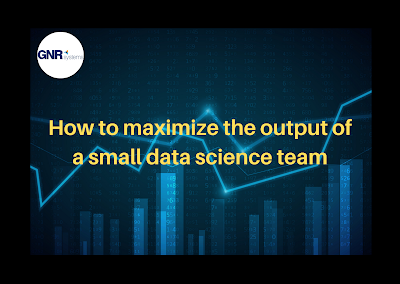How to maximize the output of a small data science team
Most businesses have outgrown the myth of the 10x engineer, but it is also necessary to foster sensible expectations of facts scientists. To maximise the output of a small records science team, companies ought to include the structures and sources crucial for them to thrive and generate outstanding ROIs. Here are some easy tenets to follow.
1. Hire generalists, Not Specialists
Most small businesses can’t at once afford to hire a expert for each position—engineers, analysts, facts scientists, visualisation specialists, etc.—and additionally don’t favor to hazard negative their output via understaffing. While the best information science crew is made up of specialists, the solution for small groups is to either hire (or become) generalists, not specialists. Larger groups may additionally employ a Director of Analytics or a Chief Data Officer to speak findings and run the team, members of small teams must have communication capabilities dispersed in the course of the group. Furthermore, barring a visualisation specialist, small groups ought to familiarise themselves with the vital packages and software.
Creating a generalised crew may without a doubt increase job delight via creating pathways for autonomy, mastery, and purpose. Many facts scientists are drawn to the discipline by the delight of fixing issues and developing an surroundings that lets in end-to-end mastery satisfies this need. Of course, companies will have to seek out this type of candidate: one who feels comfy working independently on a smaller team.
2. Stick to the (user) story
Businesses have long targeted on putting the consumer first, with the philosophy being that comprehensively assembly a customer’s wishes generates wonderful financial results. Data science teams don’t immediately engage with consumers; their “customer” is the commercial enterprise unit searching for assist with a unique problem.
To improve efficiency and output, focus on consumer stories. Stakeholders are regularly on the front lines, dealing with dilemmas at once impacting the bottom line, and by using maintaining a sharp focus on partners’ goals, information science teams become intertwined with a company’s success and responsible for the impact.
Whether person tales are written through the stakeholder or the developers, it’s necessary that they are documented. Similar to how nothing receives achieved barring a deadline, effective insights won’t be generated besides first figuring out a clear enterprise problem.
3. Encourage inter-team mentorship
Training is expensive, timely, and completely imperative in this rapidly-expanding field. High-functioning, high-output groups don’t count number completely on outdoor sources for their training; they matter on each other. Openly encourage knowledge-sharing, create the integral time, and strengthen infrastructure to support this goal. Offloading positive technical competencies can create opportunities for team contributors to enlarge into new talent units without desiring to rent new talent.
4. Develop scalable processes
Early information science tasks are interesting for any company, and accomplishing initial effects may additionally have group members working frantically with occasionally reckless abandon. Winning the day is important, but high-output information science teams need to operate at scale or else growth—the core goal—becomes burdensome.
Processes be documented each in real-time and after the project’s completion for the duration of post-mortem meetings. The goal is to create repeatable, measurable processes that reply applicable questions like: Which features were added at one of a kind factors in the production? Or, at what point does the model want to be updated?
5. Rely closely on SMEs
It’s troubling sufficient that statistics scientists have to be experts in analytics, programming, statistics, large data, cloud computing, IoT, synthetic intelligence, and computer learning, when it comes to topics like stock administration or international marketing, let other professionals step in. Don’t overburden a small crew by requiring ride backyard of the facts world. While it’s vital that the candidates can work with the advertising and income crew to disseminate records and offer data-driven insights, they do not want to comprehend how to run a advertising and marketing campaign. Subject count experts provide valuable statistics that’s not apparent to the untrained eye. Partnering with SMEs is necessary for small information science teams to create meaningful impact. Actively seeking in-house experts and outside companions extensively improves probabilities for success.





Comments
Post a Comment